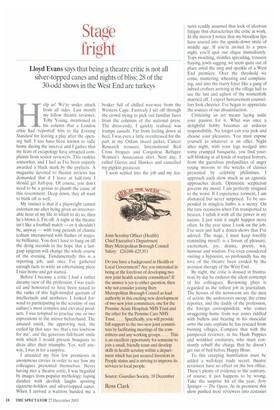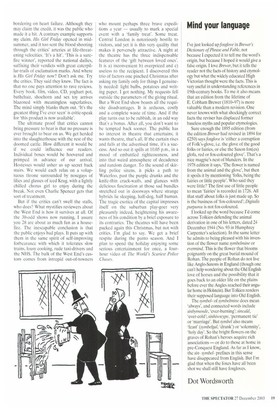Stage fright
Lloyd Evans says that being a theatre critic is not all silver-topped canes and nights of bliss: 28 of the 30-odd shows in the West End are turkeys Help us! We're under attack from all sides. Last month my fellow theatre reviewer, Toby Young, mentioned in his column that a London critic had 'reported' him to the Evening Standard for leaving a play after the opening half. I too have been known to sidle home during the interval and I gather that my feats of escapology have attracted complaints from senior reviewers. This rankles somewhat, and I feel as I've been unjustly awarded a black mark by the prefects. A magazine devoted to theatre reviews has demanded that if [leave at half-time I should get half-pay. Of course, you don't need to be a genius to plumb the cause of this resentment. Deep down, they all want to bunk off as well.
My instinct is that if a playwright cannot entertain me after being given an irrecoverable hour of my life in which to do so, then he's blown it. I'm off. A night at the theatre isn't like a football match — or it shouldn't be, anyway — with long periods of chaotic tedium interspersed with flashes of majestic brilliance. You don't have to hang on till the dying seconds in the hope that a lastgasp epigram will change the whole course of the evening. Fundamentally this is a reporting job, and once I've gathered enough facts to write an entertaining piece I race home and get started.
Before I became a critic I had a rather dreamy view of the profession. I was excited and honoured to have been raised to the ranks of this high-minded quorum of intellectuals and aesthetes. I looked forward to participating in the scrutiny of our culture's most complex and elevated products. I was tempted to practise one or two expressions in the mirror beforehand. The amused smirk, the approving nod, the curled lip that says 'no, that's too lowbrow for me', and the generous full-beam smile with which I would present bouquets to divas after their triumphs. Yes, well anyway, I was in for a surprise.
I attended my first few premieres in anonymous civvies in order to see how my colleagues presented themselves. Never having met a theatre critic, I was beguiled by images from popular mythology: lisping dandies with devilish laughs sporting cigarette-holders and silver-topped canes. When I arrived a waitress handed me a beaker full of chilled wee-wee from the Western Cape. Furtively I set off through the crowd trying to pick out familiar faces from the columns of the national press. The dress-code, I quickly realised, was frumpy casuals. Far from feeling down at heel, I was even a little overdressed for the part in my Oxfam tweed jacket, Cancer Research trousers, International Red Cross brogues and Congolese Refugee Women's Association shirt. Next day, I called Gieves and Hawkes and cancelled my pigskin greatcoat.
I soon settled into the job and my fea tures readily assumed that look of ulcerous fatigue that characterises the critic at work. In the mirror I notice that my bloodless lips have soured into the upside-down smile of middle age. If you're invited to a press night, you'll spot our clique immediately. Tops moulting, middles spreading, trousers fraying, jowls sagging, we seem quite out of place amid the zing and sparkle of a West End premiere. Over the threshold we come, muttering, wheezing and complaining, and into the starry foyer like a gang of inbred crofters arriving at the village hall to see the last and ugliest of the womenfolk married off. I expect bereavement counsellors look cheerier. I've begun to appreciate the sources of our dissatisfaction.
Criticising an art means laying aside your passion for it. What was once a delightful hobby becomes an arduous responsibility. No longer can you pick and choose your pleasures. You must expose yourself to whatever is on offer. Night after night, with your legs wedged into some cramped banquette, you find yourself blinking at all kinds of warped horrors, from the garrulous profundities of angry young morons to the wrecks of classics presented by celebrity philistines. I approach each show much as an agnostic approaches death. Optimistic scepticism governs my mood. I am perfectly resigned to the worst. If! experience torment, I am dismayed but never surprised. To be suspended in stingless limbo is a mercy. On the rare occasions when I'm transported to heaven, I relish it with all the power in my nature. I just wish it might happen more often. In the year since I took on the job. I've seen just half a dozen shows that I've adored. The stage, I must keep forcibly reminding myself, is a forum of pleasure, excitement, joy, drama, poetry, wit, humour and wisdom. I've even considered visiting a hypnotist, so profoundly has my love of the theatre been eroded by the aversion therapy of the West End.
By night, the critic is doused in frustration, by day he endures the silent contempt of his colleagues. Reviewing plays is regarded as the softest job in journalism. The heroes of the newsroom are the men of action: the undercover snoop, the crime reporter, and the daddy of the profession, the foreign correspondent, who comes swaggering home from war zones riddled with bullets and bearing in his muscular arms the cute orphans he has rescued from burning villages. Compare that with the pampered reviewer, in his Hush Puppies and wrinkled corduroys, who must constantly rebuff the charge that he doesn't get out of bed before Happy Hour.
To this creeping humiliation must be added a well-kept trade secret: theatre reviewers have no effect on the box office. There's plenty of evidence to the contrary, of course; it just happens to be wrong. Take the surprise hit of the year, Jerry Springer — The Opera. At its premiere this show pushed most reviewers into ecstasies
bordering on heart failure. Although they may claim the credit, it was the public who made it a hit. A contrary example supports my claim. His Girl Friday opened in midsummer, and it too sent the blood shooting through the critics' arteries at life-threatening velocities. 'It's a hit', 'This is a surefire winner', reported the national dailies, suffixing their verdicts with great caterpillar-trails of exclamation marks. And where is His Girl Friday now? Don't ask me. Try the critics. They said they knew. The fact is that no one pays attention to rave reviews. Every book, film, video, CD, yoghurt pot, bathchair, shoehorn and sex toy arrives blazoned with meaningless superlatives. The mind simply blanks them out. 'It's the greatest thing I've ever seen' is critic-speak for 'this product is now available'.
The ultimate proof that critics cannot bring pressure to bear is that no pressure is ever brought to bear on us. We get herded into the slaughterhouse with the rest of the doomed cattle. How different it would be if we could influence our readers. Individual boxes would be hoovered and primped in advance of our arrival. Hostesses would usher us up secret back stairs. We would each relax on a voluptuous throne surrounded by nosegays of lilies and glasses of iced Krug, with a lightly chilled chorus girl to enjoy during the break. Not even Charlie Spencer gets that sort of treatment.
But if the critics can't swell the stalls, who does? What mystifies reviewers about the West End is how it survives at all. Of the 30-odd shows now running, I assure you 28 are about as much fun as a housefire. The inescapable conclusion is that the public enjoys bad plays. It puts up with them in the same spirit of self-improving forbearance with which it tolerates slow trains, lousy cooking, rude taxi-drivers and the NHS. The bulk of the West End's custom comes from intrepid out-of-towners
who mount perhaps three brave expeditions a year usually to mark a special event with a 'family treat'. Some treat. Central London is notoriously hostile to visitors, and yet it is this very quality that makes it perversely attractive. A night at the theatre has the three indispensable features of the 'gift between loved ones'. It is a) inconvenient b) overpriced and c) useless to the recipient. I discovered this trio of factors one pinched Christmas after asking my family only for things I genuinely needed: light bulbs, potatoes and writing paper. I got nothing. My requests fell outside the parameters of the giving ritual. But a West End show boasts all the requisite disadvantages. It is arduous, costly and a complete waste of time. And if the play turns out to be rubbish, in an odd way that's a bonus. After all, you don't want to be tempted back sooner. The public has no interest in theatre that entertains; it wants theatre, that's all, If the curtain rises and falls at the advertised time, it's a success. And so out it spills at 10.05 p.m., in a mood of embattled righteousness, and into that weird atmosphere of decadence and random danger. To the sound of skirling police sirens, it picks a path to Waterloo, past the purple drunks and the knife-thin crack-waifs, and glances with delicious fascination at those sad bundles stretched out in doorways where strange hybrids lie sleeping, half-dog, half human. The tragic exotica of the capital impresses itself on the suburban play-goer very pleasantly indeed, heightening his awareness of his condition by a brief exposure to its contraries. The theatres will have been packed again this Christmas, but not with critics, I'm glad to say. We get a brief respite during the panto season. And plan to spend the holiday enjoying some serious entertainment for once, a fourhour video of The World's Scariest Police Chases.



























































 Previous page
Previous page